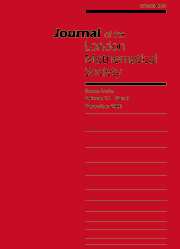Crossref Citations
This article has been cited by the following publications. This list is generated based on data provided by
Crossref.
Ponce, Mario
2007.
Local dynamics for fibred holomorphic transformations.
Nonlinearity,
Vol. 20,
Issue. 12,
p.
2939.
Fabbri, Roberta
Johnson, Russell
and
Zampogni, Luca
2008.
Ordinary Differential Equations.
Vol. 4,
Issue. ,
p.
133.
Bjerklöv, Kristian
and
Jäger, Tobias
2008.
Rotation numbers for quasiperiodically forced circle maps-mode-locking vs. strict monotonicity.
Journal of the American Mathematical Society,
Vol. 22,
Issue. 2,
p.
353.
Jäger, T.
2009.
Linearization of conservative toral homeomorphisms.
Inventiones mathematicae,
Vol. 176,
Issue. 3,
p.
601.
Huang, Wen
and
Yi, Yingfei
2009.
Almost periodically forced circle flows.
Journal of Functional Analysis,
Vol. 257,
Issue. 3,
p.
832.
Jäger, T.
2009.
The concept of bounded mean motion for toral homeomorphisms.
Dynamical Systems,
Vol. 24,
Issue. 3,
p.
277.
Jäger, Tobias
2009.
Strange Non-Chaotic Attractors in Quasiperiodically Forced Circle Maps.
Communications in Mathematical Physics,
Vol. 289,
Issue. 1,
p.
253.
Dullin, H. R.
and
Meiss, J. D.
2009.
Quadratic Volume-Preserving Maps: Invariant Circles and Bifurcations.
SIAM Journal on Applied Dynamical Systems,
Vol. 8,
Issue. 1,
p.
76.
Glendinning, P A
Jäger, T
and
Stark, J
2009.
Strangely dispersed minimal sets in the quasiperiodically forced Arnold circle map.
Nonlinearity,
Vol. 22,
Issue. 4,
p.
835.
ALISTE-PRIETO, JOSÉ
2010.
Translation numbers for a class of maps on the dynamical systems arising from quasicrystals in the real line.
Ergodic Theory and Dynamical Systems,
Vol. 30,
Issue. 2,
p.
565.
Wang, Jing
2012.
Lower dimensional invariant tori for quasiperiodically forced circle diffeomorphisms.
Journal of Differential Equations,
Vol. 253,
Issue. 5,
p.
1489.
Glendinning, Paul
Ashwin, Peter
Broomhead, David
Callard, Robin
Nicol, Matthew
and
Sturman, Rob
2012.
Jaroslav Stark: 1960–2010.
Dynamical Systems,
Vol. 27,
Issue. 1,
p.
1.
Wang, Jing
and
Zhou, Qi
2012.
Simultaneous linearization for commuting quasiperiodically forced circle diffeomorphisms.
Proceedings of the American Mathematical Society,
Vol. 141,
Issue. 2,
p.
625.
Aliste-Prieto, J.
and
Jäger, T.
2012.
Almost periodic structures and the semiconjugacy problem.
Journal of Differential Equations,
Vol. 252,
Issue. 9,
p.
4988.
Anagnostopoulou, V.
and
Jäger, T.
2012.
Nonautonomous saddle-node bifurcations: Random and deterministic forcing.
Journal of Differential Equations,
Vol. 253,
Issue. 2,
p.
379.
Luque, Alejandro
and
Villanueva, Jordi
2014.
Quasi-Periodic Frequency Analysis Using Averaging-Extrapolation Methods.
SIAM Journal on Applied Dynamical Systems,
Vol. 13,
Issue. 1,
p.
1.
Gan, Shaobo
Shi, Yi
and
Zheng, Rusong
2015.
Rotation set of torus homeomorphisms preserving minimal foliations.
Dynamical Systems,
Vol. 30,
Issue. 4,
p.
426.
Lanford, O E
and
Mintchev, S M
2015.
Stability of a family of travelling wave solutions in a feedforward chain of phase oscillators.
Nonlinearity,
Vol. 28,
Issue. 1,
p.
237.
JÄGER, T.
and
TAL, F.
2017.
Irrational rotation factors for conservative torus homeomorphisms.
Ergodic Theory and Dynamical Systems,
Vol. 37,
Issue. 5,
p.
1537.
Wang, Jian
and
Zhang, Zhiyuan
2018.
The rigidity of pseudo-rotations on the two-torus and a question of Norton-Sullivan.
Geometric and Functional Analysis,
Vol. 28,
Issue. 5,
p.
1487.

